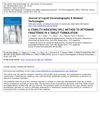 28 citations,
February 2016 in “International Journal of Nanomedicine”
28 citations,
February 2016 in “International Journal of Nanomedicine” Finasteride capsules with nanoparticles improve drug delivery, solubility, stability, and effectiveness.
 26 citations,
June 2005 in “Journal of Molecular Endocrinology”
26 citations,
June 2005 in “Journal of Molecular Endocrinology” Dutasteride is more efficient than finasteride, but individual results vary.
 22 citations,
March 2018 in “International Ophthalmology”
22 citations,
March 2018 in “International Ophthalmology” Taking tamsulosin or finasteride and being older increase the risk of floppy iris during cataract surgery.
 19 citations,
April 2020 in “Dermatologic Therapy”
19 citations,
April 2020 in “Dermatologic Therapy” Dutasteride works better than finasteride for hair loss, with both being safe to use.
 19 citations,
December 2002 in “Journal of Liquid Chromatography & Related Technologies”
19 citations,
December 2002 in “Journal of Liquid Chromatography & Related Technologies” New method quickly and accurately measures finasteride in tablets.
 14 citations,
December 2007 in “Journal of The European Academy of Dermatology and Venereology”
14 citations,
December 2007 in “Journal of The European Academy of Dermatology and Venereology” The article concludes that dermatologists should prescribe lifestyle drugs carefully and consider mental health treatments for patients with disorders like BDD.
 13 citations,
February 2015 in “Journal of Pharmaceutical Sciences”
13 citations,
February 2015 in “Journal of Pharmaceutical Sciences” Three finasteride forms exist; "form X" doesn't.
 8 citations,
October 1998 in “Comparative Biochemistry and Physiology Part C: Pharmacology, Toxicology and Endocrinology”
8 citations,
October 1998 in “Comparative Biochemistry and Physiology Part C: Pharmacology, Toxicology and Endocrinology” Proscar (finasteride) blocks 5α-reductase in sea urchin ovaries and testes, suggesting potential treatment for androgen-related conditions.
 4 citations,
November 2022 in “Frontiers in endocrinology”
4 citations,
November 2022 in “Frontiers in endocrinology” The enzyme 5α-reductase type 1 is important for blood vessel development and fertility in the uterus.
 3 citations,
January 2015 in “Journal of drug assessment”
3 citations,
January 2015 in “Journal of drug assessment” Taking five small dutasteride capsules is the same as taking one larger capsule.
 3 citations,
January 1994 in “Toxicological Sciences”
3 citations,
January 1994 in “Toxicological Sciences” Finasteride causes abnormal growth in male mice cells at high doses.
 1 citations,
November 2008 in “Gerontology”
1 citations,
November 2008 in “Gerontology” Older adults use lifestyle drugs to improve life quality and appearance, but caution is needed due to side effects and potential abuse.
April 2020 in “The FASEB Journal” Finasteride may cause lasting sexual issues by altering specific genes in human cells.
14 citations,
May 2016 in “Therapeutic advances in urology” Taking tadalafil and finasteride together is safe and effective for treating urinary symptoms and erectile dysfunction in men with enlarged prostates.
February 2020 in “Definitions” 5 citations,
January 1994 in “PubMed” 18 citations,
November 2012 in “Current opinion in urology” Finasteride and dutasteride are equally effective and safe for treating benign prostatic hyperplasia.
 March 2023 in “Translational Andrology and Urology”
March 2023 in “Translational Andrology and Urology” 5-alpha reductase inhibitors, like finasteride and dutasteride, are used for prostate issues, hair loss, and excessive hair growth, may help with COVID-19, but can cause sexual and mental health side effects, and their use in preventing prostate cancer needs more examination.
 36 citations,
June 2014 in “PLOS ONE”
36 citations,
June 2014 in “PLOS ONE” Finasteride, a hair loss drug, may cause long-term sexual side effects due to changes in hormone receptor levels.
 2 citations,
February 2023 in “BJUI”
2 citations,
February 2023 in “BJUI” Urologists should monitor mental health in patients taking finasteride due to potential links to suicidal thoughts, adjusting dosage or stopping use if necessary. More research is needed to confirm if finasteride causes these thoughts.
Nanotechnology shows promise for better hair loss treatments but needs more research for safety and effectiveness.
April 2023 in “European urology open science” Urologists should screen for mental health issues before and during finasteride treatment.
August 2021 in “Annales pharmaceutiques françaises” Topical finasteride at 0.25% is effective and has fewer side effects than oral finasteride for hair loss.
July 2005 in “Indian Journal of Dermatology” 1 citations,
March 2021 in “F1000Research” Plant-based compounds might be effective, low-side-effect treatments for prostate cancer by blocking a specific enzyme.
 7 citations,
January 2018 in “Reproduction”
7 citations,
January 2018 in “Reproduction” Inhibiting 5α-reductase increases progesterone levels in late pregnant mares.
 44 citations,
October 2010 in “BJUI”
44 citations,
October 2010 in “BJUI” 5-α-reductase inhibitors reduce prostate cancer risk but may cause sexual dysfunction and don't affect high-grade tumor or death rates.
 11 citations,
January 2000 in “The Journal of Steroid Biochemistry and Molecular Biology”
11 citations,
January 2000 in “The Journal of Steroid Biochemistry and Molecular Biology” LY320236 is a strong blocker of two enzymes that change testosterone into dihydrotestosterone and might help treat conditions related to male hormones.
408 citations,
May 2004 in “The Journal of clinical endocrinology and metabolism/Journal of clinical endocrinology & metabolism” Dutasteride more effectively lowers DHT levels in men with enlarged prostates than finasteride.
 2 citations,
November 2018 in “Indian Journal of Pharmaceutical Education”
2 citations,
November 2018 in “Indian Journal of Pharmaceutical Education” The developed model can predict effective 5-alpha-reductase enzyme inhibitors.



















